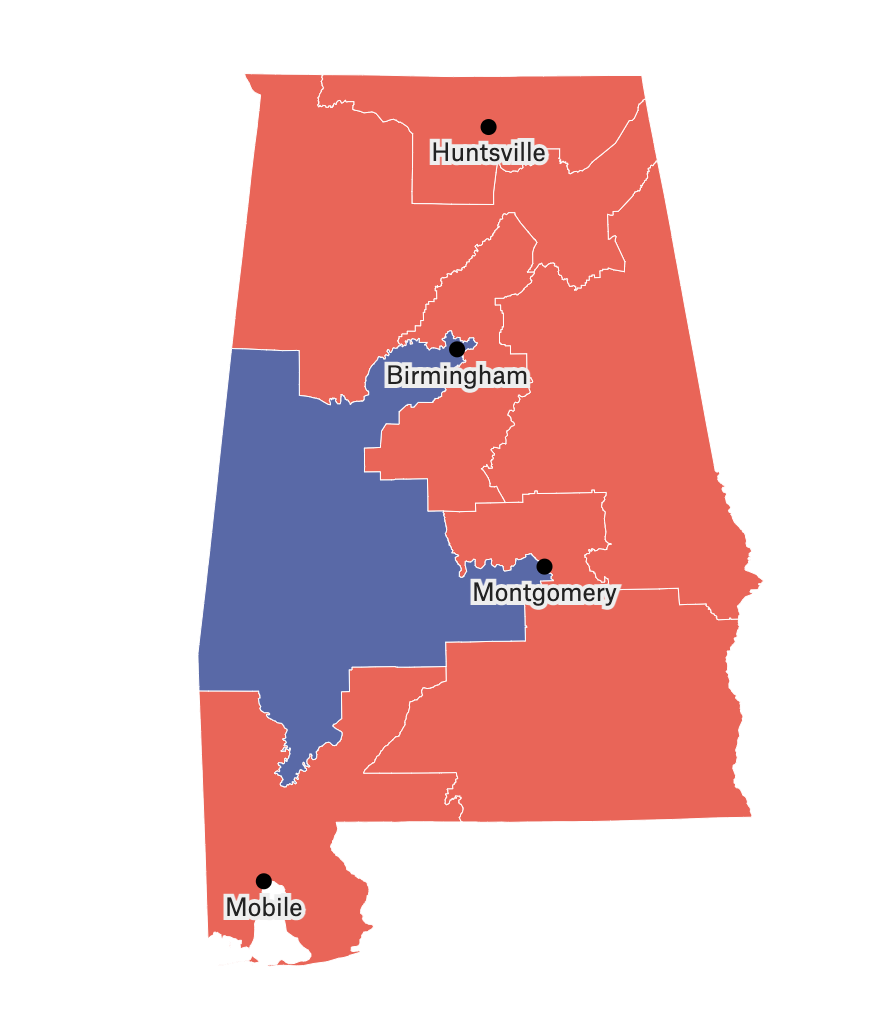
On February 7th, 2022, the United States Supreme Court ruled that the state of Alabama could move forward with a congressional district map that a lower court had deemed an illegal racial gerrymander and ordered be redrawn. A three judge district court had ruled that the map, which consisted of one Democratic district and six Republican districts, deliberately packed black voters, who vote disproportionately in favor of Democrats, into one district. Black people, however, make up roughly 25% of Alabama’s total population, meaning that at least two districts should have enough black voters to constitute a sizable, consequential voting bloc. In overturning the decision, the Supreme Court did not issue an opinion, which is consistent with other time-sensitive “emergency” decisions, but Justice Brett Kavanaugh, a member of the conservative 5-4 majority in this case, stated that the Court’s reasoning was that the lower court mandated alterations to the map were ordered too close to election day, and should be postponed until they can be litigated in a more comprehensive manner. But critics have pointed out that this decision, delivered by a Supreme Court consisting of a 6-3 Republican majority, has broken with precedent in similar voting rights cases in order to block a ruling that would have favored Democrats. Thus, this decision deserves further analysis to determine if this use of judicial review constitutes an instance of democratic backsliding.
On one hand, it could certainly be argued that the Supreme Court’s decision constitutes a disruption of mutual toleration in the U.S., in which opposing parties and ideologies allow one another the rights to fairly compete for and obtain power so long as they abide by the Constitution. Breaking with precedent to strike down a law that would benefit those on the other side of the ideological aisle would certainly appear to be operating outside the bounds of mutual toleration. The aspect of breaking with precedent also invokes questions about the Court’s institutional forbearance, or ability to exercise restraint in issues concerning its own interests in order to adhere to current laws or norms. Traditionally, lower court decisions regarding voting rights, like the one in Alabama, are not halted unless there are serious questions about the legal interpretation of the lower court, which was not perceived as being an applicable issue in this case by credible outside legal observers. And while one could argue that this is just one case concerning the partisan lean of just one congressional district, this would not take into account the power of precedent in American judicial proceedings, in which the establishment of a new norm, such as putting off challenges to gerrymandered electoral maps, could have consequences for congressional maps across the country, many of which could be in larger states where more than one contested congressional district hang in the balance. Large states like Pennsylvania and North Carolina have had congressional maps that were recently deemed to be gerrymandered by the courts, and thus redrawn in more equitable manners. The precedent created by this decision regarding Alabama could have repercussions for cases like those in Pennsylvania and North Carolina in the future, muddling the path to resolving clear gerrymandering violations. Thus, this decision gives courts greater flexibility with granting or stalling lower court orders to resolve voting and election issues, which could easily be utilized by whichever party currently exercises more influence in the courts. It would thereby appear that, whether intentionally or simply as a result of biases on a disproportionately conservative Supreme Court, the Court’s decision did in decrease the political power of their ideological opponents in a way that broke with precedent and disenfranchised certain voters. This, it could be argued, is a textbook example of an instance of democratic backsliding.
With this in mind, are there any reasons to be hopeful, or question the Supreme Court’s Alabama decision as an instance of democratic backsliding? One reassuring aspect of this case was that the three judge panel that originally ordered that Alabama’s new congressional map be changed consisted of two judges appointed by President Donald Trump, who was responsible for giving the Supreme Court its current 6-3 conservative supermajority. Thus, it is encouraging that at the lower level, two conservative judges did seem to be able to put their own political interests and biases aside to honor law and precedent and order that Alabama’s congressional map be redone. Thus, while some aspects of America’s court system may be experiencing democratic backsliding, it appears that it does still have segments that are functioning properly, and aiming to uphold democracy as it exists in America today.
While the Supreme Court’s Alabama decision does seem to meet the definition of democratic backsliding, it is currently unclear how impactful this case will turn out to be. If it does establish a new precedent and turns out to be a signal of a turning tide in the American judiciary, it may turn out to be one of the most consequential court cases for American democracy in recent history.

I enjoyed reading your take on this recent Supreme Court ruling. I agree with you that this represents a concerning violation of mutual tolerance on behalf of the Supreme Court which seems to be acting as partisans rather than independent adjudicators. I also agree that it is reassuring that two judges that Trump appointed judges were able to set aside their partisan considerations. However, I think that because the Supreme Court has the power to overturn lower courts’ decisions, there isn’t much hope for democracy if this decision by the Supreme Court truly is the beginning of a judicial phase of democratic erosion. Ultimately, the actors with the most power to erode democracy are those on the national level. Lower courts won’t be able to do much to stop the Supreme Court. It will be interesting to see if this case truly represents the beginning of democratic erosion or, hopefully, is just a blip that will soon be forgotten.